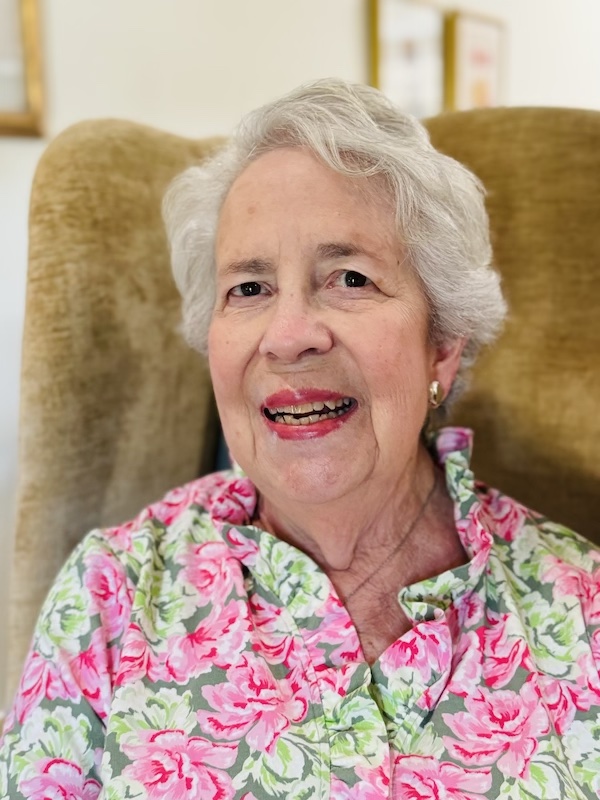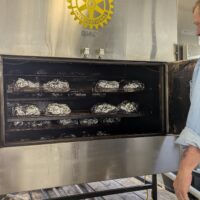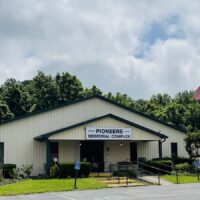Wednesday evening at a church meeting (truly, not a bad place to pick up story tips), I heard that my friend Ginny Lawson had recruited two other women to go shopping that day for supplies to help North Carolina communities struggling with the destruction of their homes, roads and infrastructure following Hurricane Helene.
The devastation had gotten Ginny’s attention, and she was on a roll this week to do her part. Monday she drove downtown to the Salvation Army office and handed them a check to help with the storm response. On Tuesday she convinced members of the Hopkinsville History and Literature Club to nearly clean out the club’s checking account and send $500 to American Red Cross. And by Wednesday she was at Walmart with two friends filling carts with breakfast bars, cans of soup, diapers, socks and flashlights.

That’s why I called Ginny and asked that she write about taking her Walmart haul to the local airport.
I won’t deny that I was pleased Ginny and others learned about the airport project, which was part of a larger endeavor called Operation Airdrop, from a Hoptown Chronicle story we ran early in the week. Getting a reader to write about how they respond to our journalism is a meaningful part of our mission as a nonprofit news outlet. It’s like our connective tissue. Our glue. On our best days, we connect crucial information with people who have the will to respond.
On a personal level, I also enjoy being able to say I gave my former middle school English teacher a story assignment. How many news editors can say that? Surely, not many. But it’s true in this case. Fifty years ago this fall Ginny was my seventh grade English and homeroom teacher.
The rest of the story
After Ginny gave me her hand-written story, which you can read here, I went from her house to the airport to get a photograph of the conference room where many donors had been stacking boxes and sacks of supplies. I spoke with William Outlaw, the airport director and general manager. He had more to add to this story.
Here’s what I learned:
Donors brought several tons of food and supplies to the Hopkinsville airport to help the storm victims.
William and two other pilots who volunteered to help — Todd LeClair of Trigg County and Walker Eifert of Clarksville, Tennessee — made several flights to get supplies to areas affected by the storm. They flew into Concord, North Carolina, and Greeneville, Tennessee.

After the planes from Hopkinsville landed, some of the supplies were loaded on horse trailers and then driven to staging points where mules and horses finished the haul into some of the most rugged and remote regions dealing with storm damages.
Along with the food and paper products that piled up in the airport conference room, local organizers also received cash donations — totaling about $3,500 as of Thursday afternoon — to help pay for fuel. William estimated the fuel bill for each flight was about $500.
An unexpected gift
Part of the cash fund for fuel had an interesting origin.
Weeks before the storm, an out-of-towner accidentally dropped $950 in cash on the floor inside the Hopkinsville airport terminal. William reviewed some security video, figured out which pilot had lost the money when it fell from his pocket and called him.
The man thanked him and then suggested William keep the money and use it to help toward a good cause.
William told me that originally he was thinking maybe the money would help when the airport plans a day for local youth to take free flights and learn about being a pilot.
But then the storm ravaged a wide swath of the Southeast and it made sense to use the donation for fuel so Hopkinsville could join the Operation Airdrop effort.
One more detail.
That pilot who lost his money in Hopkinsville weeks before Hurricane Helene struck … He remains anonymous but William said he is from North Carolina.
More ways to help
The Hopkinsville airport finished its Operation Airdrop collection on Thursday and the last flight to deliver donated items was planned on Friday.
But as Ginny reminded me, people are still looking for ways to help. So we pulled together a list of organizations that are working in the affected communities. Here are five to consider if you are interested in making a donation:
- BeLoved Asheville, a community-based nonprofit that addresses local issues, such as housing and health care disparities. The organization is now dedicating all of its resources to storm relief by providing food, clothing, shelter and counseling.
- World Central Kitchen has set up high-capacity kitchens in Asheville. The charity founded by chef Jose Andres is also serving free meals in Florida, Georgia and Tennessee.
- Salvation Army is providing assistance to thousands of people affected by Helene with food, drinks, emotional support and spiritual care.
- North Carolina Disaster Relief Fund is collecting donations that will support the nonprofits working to address the immediate needs of storm victims.
- American Red Cross has set up dozens of shelters and has assisted residents looking for loved ones who were unaccounted for after the storm.
And speaking of The Salvation Army, we learned on Friday that Hopkinsville’s Lt. David Donegan, one of the local corps officers, is serving as operations chief of The Salvation Army’s Incident Management Team in East Tennessee. He’s been there a week now.
Donegan is overseeing all direct services provided during the disaster relief operation.
“This includes overseeing food service, bulk distribution of essential goods, and emergency assistance,” a Salvation Army spokesman said in a press release. “He supervises the largest number of operational resources, ensuring that those affected by the flooding receive the help they desperately need.”
Donegan and his wife, Lt. Brittney Donegan, are new to Hopkinsville. They were assigned to lead the local office in June. But they are not new to disaster relief work. During a prior assignment in Paducah’s Salvation Army, they responded to the December 2021 tornadoes and helped with recovery in Mayfield.
Here’s hoping that help continues to flow into the communities that will need months, if not years, to recover from Helene.
Jennifer P. Brown is co-founder, publisher and editor of Hoptown Chronicle. You can reach her at editor@hoptownchronicle.org. Brown was a reporter and editor at the Kentucky New Era, where she worked for 30 years. She is a co-chair of the national advisory board to the Institute for Rural Journalism and Community Issues, governing board past president for the Kentucky Historical Society, and co-founder of the Kentucky Open Government Coalition. She serves on the Hopkinsville History Foundation's board.





